We're an affiliate
We hope you love the products we recommend! Just so you know, we may collect a share of sales or other compensation from the links on this page at no additional cost to you. Thank you if you use our links, we really appreciate it!
Pitbulls have long been stereotyped and associated with aggression toward humans and other animals.
The controversy surrounding them gained momentum in the 1980s, and until today many people still believe that these dogs are born dangerous.
So, are Pitbulls aggressive by nature? Is there any truth surrounding the long-held myth about these muscular dogs?
We’re here to debunk the falsehoods and provide you with the experts’ take on the myths that have surrounded Pitbulls for years.
Beneath the layers of these erroneous beliefs, we welcome you to discover the nature of aggression in dogs and find out how you can raise a non-aggressive Pitbull.
Understanding Aggression in Dogs
Aggression in dogs can be defined as the threat or behavior that shows hostility, dominance, and destruction towards humans and other pets.
Dog aggression toward humans can be expressed through body language such as a hard stare, lunging, or scary sounds like persistent barking, growling, snarling, or physical attacks such as biting and scratching.
You should not confuse dog aggression with some of their common assertive behavior like moderate barking and mild growling.
Aggression in dogs can be triggered by fear and pain. Dogs could become overly aggressive and hostile when you try to punish or challenge them.
Different types of Dogs aggression
- Territorial aggression
- Maternal aggression
- Pain-related aggression
- Fear-related aggression
- Frustration aggression
- Social aggression
History of Pitbulls
Pitbulls were bred by crossing a white Old English bulldog (now extinct) with a terrier in the United Kingdom.
This was done with the intention of producing a muscular dog with the agility and gameness of a terrier and the fighting spirit of a bulldog.
Pitbulls were initially used in bull-baiting, where animals were pitted against each other in an arena surrounded by spectators.
Dogs used in this bloody sport would attack the tethered bulls and bears by the neck or head and bite them until they collapsed to death.
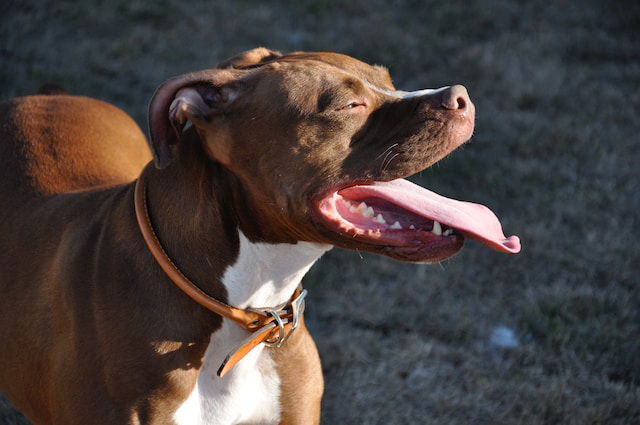
Luckily, this cruel sport was outlawed in 1835 during the rising awareness of the campaign against animal cruelty.
Crossing bulldogs and terriers gave rise to strong dogs with an innate drive to chase after prey, but they also had other lovely characteristics.
Even those Pitbulls that were originally bred to fight other animals were still friendly to their handlers.
These muscular dogs are family-oriented and they can build an unwavering loyalty to their owners.
This explains why most dog owners in Ireland refer to Pitties as ‘Old family dogs’ or ‘Nanny dogs’.
Pitbulls are also gentle with children, and they have a mild protective nature that makes them obedient in following commands from their owners.
They are also very eager to please their human caregivers. These dogs would go the extra mile to complete a task assigned by their handlers, and they loved to be praised.
Their love for attention means that you can socially train these gentle giants to freely interact with their environment, including other pets.
Physical And Behavioral Traits of Pitbulls
Pitbull dogs are categorized as medium-sized breeds, with their adult males weighing between 35-70 pounds and females tipping the scale to 30-60 pounds.
A male adult Pitbull will have an average height between 18-21 inches, while a female will stand between 17-20 inches tall.
Pitbulls have short and smooth coats crowning their muscular bodies with blocky heads. These dogs have high energy levels which makes them ideal for use as working dogs.
The most common Pitbull colors are White, black, brown, and their combinations.
Even though Pitbulls are not typically good guard dogs, you can leverage their physical attributes and train them to become watchdogs.
In terms of behavior, Pitbulls are known to be extremely friendly with people, and fun-loving. They love jumping on their owners and cuddling for long hours.
A well-socialized Pitbull cannot resist the urge to jump on a guest seated on the couch, posturing for cuddling and petting.
Are Pitbulls Aggressive by Nature?
Pitbulls are NOT aggressive by nature! In fact, they are one of the most people-oriented dog breeds you can keep at home.
A study by Dr. Pamela Reid has shown that Pitbulls are not inherently aggressive towards humans, although some of them can be less tolerant of other dogs.
Even though these muscular dogs were initially bred for dogfighting and other cruel sports, they also find lots of pleasure in interacting with humans.
They are impressively intelligent, obedient to instruction, and sometimes clingy to their owners. Pitties have long been used as working dogs to assist their owners in herding, hunting, and guarding farms.
They are very eager to please, and they can be trained and socialized to interact with humans gently without being reactive.
Why Do Pitbulls Have a Bad Reputation?
One of the reasons for this debate is the bad reputation and misconceptions surrounding Pitbulls, especially their perceived hostility towards humans.
This stereotype began in the 1980s and was partly propagated by the media.
In 1987, Times Magazine published an issue titled ”The Pitbull: Friend and Killer” with a picture of a Pitbull with bared teeth and a hard stare.
This magazine published several stories that portrayed Pitbulls in a bad light, contributing to the creation of fear among many people about Pitbulls in society.
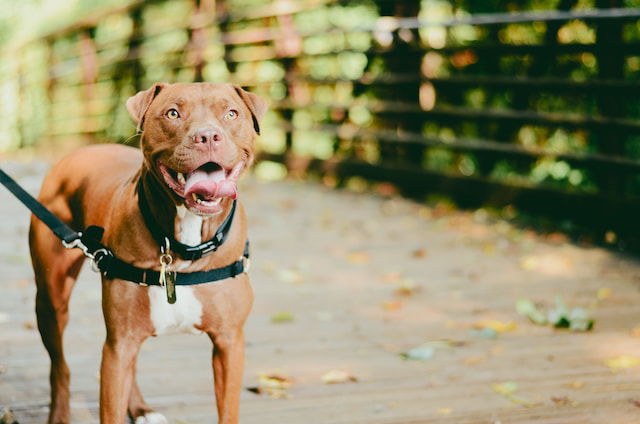
Similarly, Sports Illustrated published an issue with the title ‘Beware of This Dog’, featuring a Pitbull showing their teeth.
These stories also encouraged unscrupulous individuals to breed Pitbulls for their ill motives and crime-related activities.
The widespread unethical breeding of Pitbulls further put well-raised Pitties in hot water, as many municipalities began to illegalize the ownership of Pitbulls.
Factors that Contribute to Pitbull Aggression
Although Pitbulls are not born with a natural offensive charm to humans, like any other dog, they can be provoked to anger.
1. Lack of Socialization
A Pitbull who spends most of their time indoors without ever seeing the outside world will certainly develop undesirable behavior.
You should expose your Pitbull to many people and take them for walks around your neighborhood to familiarize them with the environment.
A lack of social training will predispose the dog to develop fear, anxiety, and aggression, among other negative behaviors, which can then mature into aggression.
Exposing your dog to different social environments will also help them to develop positive ways to react in different settings without fear or stress.
2. Poor breeding practices
A clique of unethical breeders would normally prioritize the physical attributes of Pitbulls without considering their health or emotional temperament.
Poor breeding may result in developing hostile Pitbulls who end up using their strength for ill-motives.
A Pitbull puppy bred and raised wrongly will certainly develop aggression and unfriendly behavior towards people and animals alike.
3. Abuse and Neglect
If your Pitbull has had previous experiences of physical abuse or neglect, then they may develop aggressive behavior as a response to fear.
Dogs who have suffered untold traumatic experiences from humans will develop distrust and defensive behavior.
This is because they do not want a repeat of what happened to them, and as a result, they may be unfriendly towards all humans.
4. Health Issues
Sometimes, Pitbulls may react aggressively when they are disturbed because they are suffering from serious health conditions.
These are mostly conditions that bring physical pain and discomfort to the dog, which may make them unwelcoming to humans.
We recommend taking your Pitbull to regular checkups at the vet for early detection of chronic illnesses.
Prompt treatment of health issues will greatly increase the chances of your dog fully recovering.
Don’t forget to provide proper meals to your dog and take them out for physical stimulation to boost their fitness.
Pitbulls and Human Safety
More than a few Pitbulls have hit the headlines because of all the wrong reasons; attacking humans. This is one of the major reasons why most people have issues with these dogs.
Reported Pitbulls attacks on humans
There has been lots of media coverage in the recent past about Pitbulls attacking humans.
Pitbulls form about 6% of the dog population in the world, but it’s reported that they are responsible for a staggering 68% of dog attacks on humans.
The reports on Pitbull attacks are causing further stereotypes in the general public, who continue to view these dogs are naturally aggressive.
Supporters of Pitbulls argue that ‘every dog is an individual’, and those unlucky Pitties that attacked humans have suffered at the hands of irresponsible owners.
Pitbulls are just like any other breed. When they are not raised properly, they can develop unwanted behavior, which includes aggression and intolerance.
Risk factors for Pitbull attacks
A Pitbull dog might be hostile to the general public when they are subjected to several risk factors, including:
1. Irresponsible ownership
Dog owners who don’t take good care of their canines are likely to make them develop destructive behavior.
Dogs are social animals, and they can thrive when they get plenty of human interactions with both physical and mental stimulations.
Some Pitbulls have unfortunately been neglected by their owners, which makes them less tolerant of humans and other animals.

2. Lack of Socialization
Caging a Pitbull in your compound for most of their lives will make them develop unwelcoming social skills.
Such dogs are more likely to have anger issues, fear, and anxiety, which can compound into aggression toward humans.
You need to take your Pitbull out in different social settings to introduce them to various people and environments.
Preventing Pitbull Attacks
If you ever find yourself on the verge of being attacked by a Pitbull, you need to avoid running or showing signs of fear.
Running will stimulate the dog and make them more excited to attack you.
You should stand completely still and cross your arms. Avoid making direct eye contact with the dog, since they might view this as a challenge.
Keep standing still until the dog loses interest, then move away slowly without making any noise.
As a Pitbull owner, you can take active measures to ensure your furry friend is more tolerant of the general public and other animals.
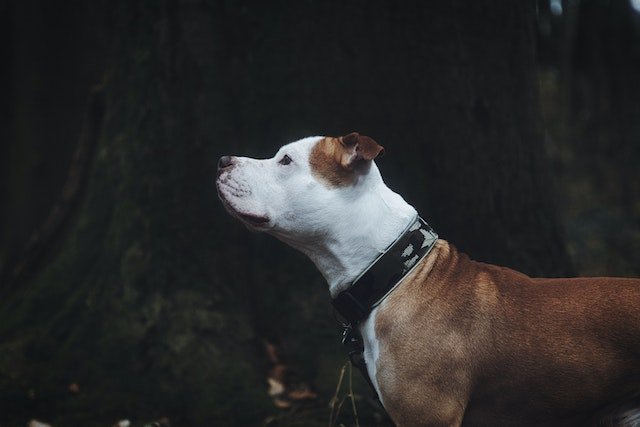
Start by socializing and training your Pitbull from an early age by exposing them to various people in different settings.
This would teach your dog how to behave when around people and they will also build an emotional attachment to the human family.
You can encourage your Pitbull to remain calm in the presence of people by using positive reinforcement methods to reward good behavior.
Make sure to always supervise your Pitbull whenever they’re interacting with other people and animals. It’s advisable to have them restrained using a comfortable harness and a strong leash.
This will prevent the dog from walking freely into unfamiliar places hence keeping them safe from traffic and other animals.
Debunking the Common Misconceptions About Pitbulls
Pitbulls have received unfair criticism due to some common myths and misconceptions about their breeds.
We are here to dispel these erroneous beliefs and to inform you that a Pitbull in the hands of a responsible owner is a great family pet.
1. Pitbulls are a very dangerous type of dog
Some people believe that Pitbulls are the most dangerous breed because of their stocky bodies and pushy faces.
Fact: Even the early Pitbulls who were bred for dog fighting were very gentle with humans during those days. The temperament of a dog is tied to their individual upbringing and not the breed’s characteristics.
2. Pitbulls are inherently aggressive
Pitbulls have been profiled as naturally aggressive due to reports of human bites and attacks.
Fact: Every dog is an individual, and we cannot blame an entire breed for the mistakes of a few negligent owners.
Aggression in dogs is certainly not a trait that is carried through genes from one generation to the next.
It is a behavior that encompasses the dog’s prenatal development, socialization, training, and other factors beyond genetics.
Any dog breed can show aggression when not well-trained. There is no scientific study that shows any specific dog breed to be more aggressive than others.
3. Pitbulls have a locking jaw
Many people believe that Pitbulls have a ‘locking jaw’ that locks strongly when they bite into something.
This myth presupposes that Pitbulls are a dangerous breed that can bite hard on humans and wage a serious attack with injuries.
Fact: Pitbulls have a similar anatomical structure to other breeds. In fact, no dog has the ability to ‘lock’ their jaws when biting.
4. All Pitbulls were bred for dogfighting
It’s indeed true that the first Pitbulls (American Pit Bull Terriers) were bred for bloody sports including fighting other canines during the medieval era. But that’s not the case for today.
Fact: The family-oriented Pitbulls in our homes and shelters today did not come from the lineage of dog fighting.
5. Pitbulls require very intensive training
Some people think that they need to have a heavier hand when training Pitbulls or other muscular canines.
Fact: The principles of teaching new tricks to dogs can be applied equally across all breeds. There’s no specific type of dog that requires a drastically different method of training them.
Dog trainers across the board have recommended the use of positive reinforcement techniques in training your dog on command and behavior.
6. Pitbulls are not good with families and kids
Due to the stereotype of aggression, some people believe that Pities are not affectionate towards their human caregivers.
Fact: Nothing could be further from the truth. Ask any responsible Pitbull parent about the lovely nature of these gentle giants towards the whole family.
Pitbulls are very affectionate, gentle with kids, eager to please, and generally people-oriented.
They derive lots of pleasure in making people happy and they love it when we cuddle or pet them as a response.
7. Pitbull are a distinctive breed
The term Pitbull has often been used to refer to a single breed, which is not true. Any stocky dog with a blocky head has often been referred to as a Pitbull, which could perhaps be the reason for widespread misinformation about the real Pitbulls.
Fact: Pitbull is a general term used to describe several ‘bully breeds’. They include: The American Bully, American Pitbull Terrier, American Staffordshire Terrier, Staffordshire Bull Terrier, and their crossbreeds.
Legal Issues Surrounding Pitbulls
Due to the endless controversy and debates surrounding the safety of owning Pitbulls, these dogs have been the center of breed-specific legislation (BSL) across many nations and states.
Breed-specific legislation is a legal enactment that either bans the ownership of certain breeds in specific counties or restricts the breed to a few places.
It’s important to note that no state in the US has outrightly banned the ownership of Pitbulls. We only have specific counties that have enacted BSLs in their areas of jurisdiction as a response to the reported cases of dog attacks.
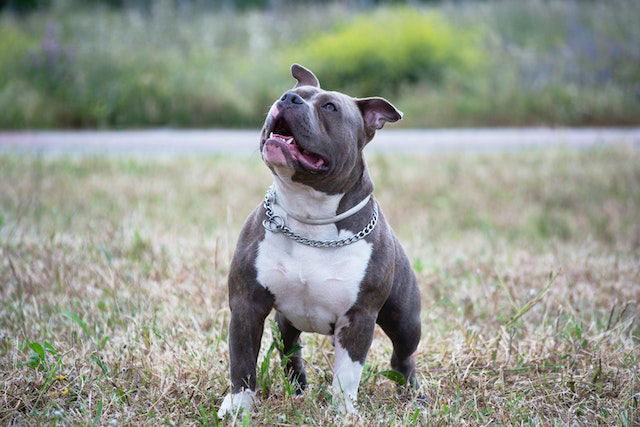
Most BSLs are enacted to regulate Pitbulls and their crossbreeds.
Other breeds that have often been profiled in some territories include American Bulldogs, Dalmatians, Chow Chows, Mastiffs, German Shepherds, Rottweilers, and Doberman Pinschers, and their crossbreeds.
Advocates of Pitbulls have been at the forefront against the enactment of BSLs because such laws unfairly discriminate against certain breeds.
There has never been any substantial evidence that BSLs can be used to make the community a safer place.
A good example is Aragon in Spain, where they have seen no changes in the number of dog attacks five years before and five years after breed-specific bans were legislated.
And worse of all, these breed bans can also be used to further the stereotype against Pitbulls, making them a center of unfair condemnation.
Breed-discriminatory laws against Pitbulls are ineffective because they tend to address the result (a dog bite) instead of dealing with the underlying cause (irresponsible breeders and bad dog owners).
If you ban Pitbulls in a particular territory, people with ill motives would still turn their attention to other dog breeds and raise them for their illegal activities.
A good example is the increase in general dog bites in 2005, when Pitbulls were banned in Council Bluff, Iowa.
Pitbulls were also banned in Winnipeg, Canada in 1990, and the cases of Rottweiller bites started to rise within the area.
Ten years later, the city council revoked the ban on Pitbulls, and all the dog bites decreased significantly.
How To Raise a Non-Aggressive Pitbull
Pitbulls are just like any other dog. They can become responsible adults when raised well and trained from an early age. So don’t fear adopting one from the shelter.
We have seen that every dog is an individual and that Pitbulls are not naturally aggressive. Raising your Pitbull in the right way will help them to shape good behavior and interaction with humans.
The first thing you should always do is choose a reputable breeder with ethical practices. Get a Pitbull puppy that has known parents with a history of having positive interactions with humans.
Once the puppy is weaned from their mother, you can start exposing them to the outside world slowly and in a controlled environment.
Socialize the puppy and introduce them to every family member in the house and other pets if you have any.
This will help them start creating a bond early enough with the family and shape their social skills as they grow.
Some Pitbulls can be predisposed to inter-dog aggression as a result of fearfulness and hierarchal competition.
You need to socialize your Pitbull with other dogs since they are more likely to develop dog-related fear than human aggression.
Set some time regularly to train and educate your Pitbull on good manners and how to respond in different situations. This will help create a balanced dog and avoid behavioral problems.
Make sure to provide a healthy and balanced diet according to your Pitbull’s age and size. They should have enough of all nutrients and minerals to keep them healthy and fit. You can work this out with a canine nutritionist.
Talking about health, you should have regular visits to the vet for checkups, timely vaccine shots, and early treatment of diseases.
Lastly, you should know your Pitbull’s body language and verbal communication. This will help you in knowing your dog’s mood and offering help when they need it.
Conclusion
Are Pitbulls aggressive by nature? No! they’re not. The aggression exhibited by Pitbulls towards humans is a result of poor breeding, lack of socialization, abuse, and neglect.
Contrary to this negative stereotype, Pitbulls are lovely dogs and are mostly motivated to make their owners happy.
Although they were initially bred for cruel bloody sports, they have since become one of the best pets in the world.
However, they have been unfairly labeled as ‘aggressive dogs’ due to cases of dog attacks across various states.
Any dog in the hands of an irresponsible owner can bite or attack people. It is unfair to categorize all Pitbulls as aggressive due to the actions of a few irresponsible handlers.
With the right training and socialization, you can raise your Pitbull to become a lovely family dog and a companion to your outdoor adventures.
Laura is the founder of Furs'n'Paws. She is a also a pet writer and expert with more than 20 years of experience of working with dogs and cats. She developed a very strong love for animals at a young age. Her passion led her to establish a thriving pet sitting and dog walking business in Dubai. As an expert in pet training, behavior, and nutrition, Laura is committed to helping pet owners and pet lovers by offering high-quality information on a wide range of topics.


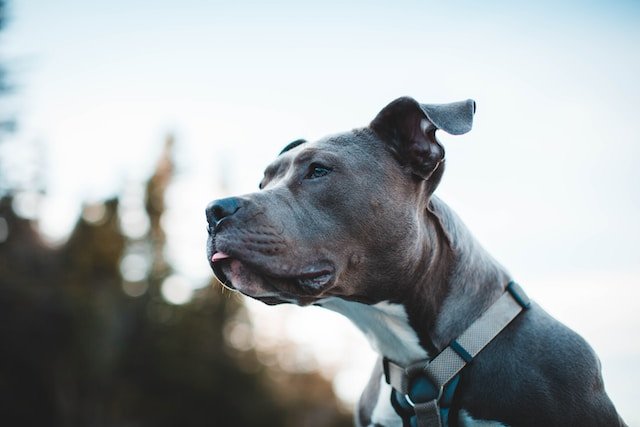
No responses yet